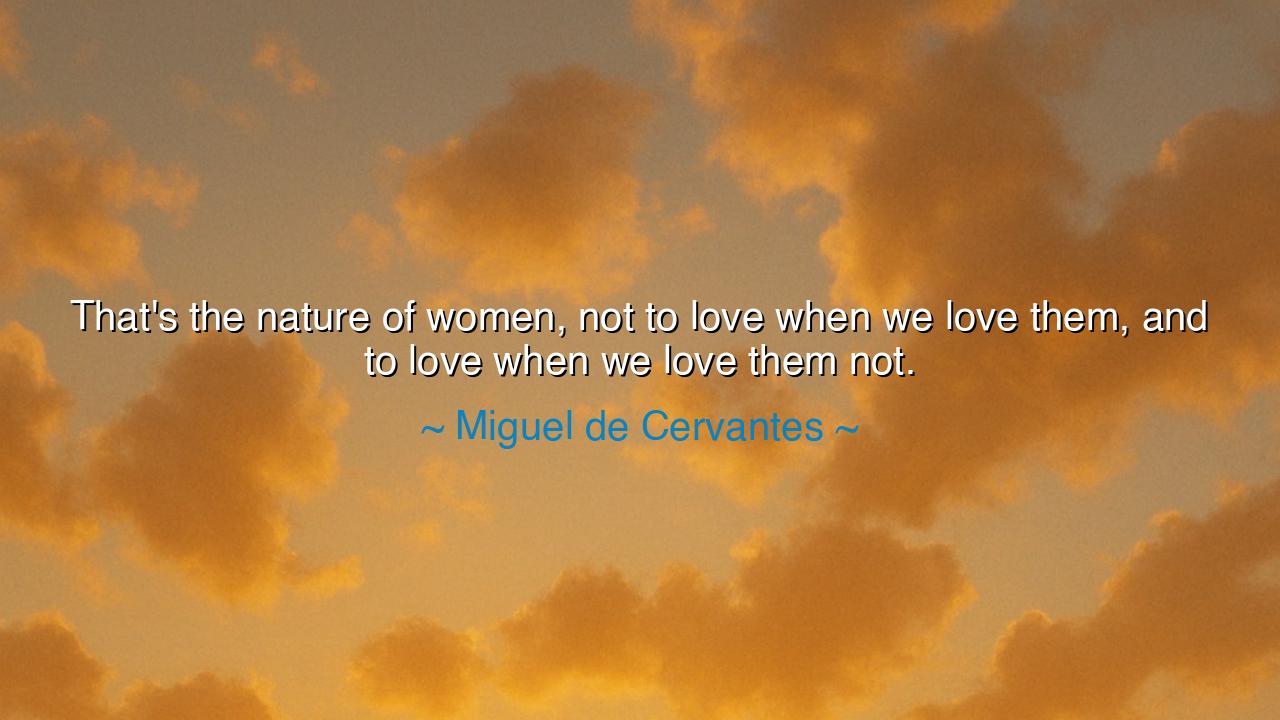
That's the nature of women, not to love when we love them, and
That's the nature of women, not to love when we love them, and to love when we love them not.






In the words of Miguel de Cervantes, “That’s the nature of women, not to love when we love them, and to love when we love them not.” This phrase, though simple in sound, contains within it the eternal paradox of the human heart. Cervantes, the wise observer of life and the author of Don Quixote, knew well the mysteries of affection, the dance of desire, and the shifting tides of passion. His words are not condemnation, but recognition: that love is not a thing of reason, but of rhythm, and that the soul often hungers most for what flees from its grasp.
To say this is the “nature of women” is to speak in the tongue of his age, where women embodied the great mysteries of love and longing. Yet in truth, it is the nature of all hearts, both male and female, for desire is born not in stillness but in tension. When one is adored, one may feel burdened by the weight of another’s longing, and when that adoration fades, the heart, now unchained, yearns again for what is lost. Thus, love lives not only in possession but in pursuit. Cervantes, with the eyes of a poet and the scars of a soldier, saw this eternal pattern etched upon the stage of human life.
Consider the tragic tale of Antony and Cleopatra. When Antony burned with devotion, Cleopatra, proud and cautious, tested him, withheld her flame, and wielded her charms like a weapon. Yet when Antony’s loyalty wavered, and his power faltered, Cleopatra’s passion blazed with desperate force. Their love was a storm of timing, often misaligned, leading not to harmony but ruin. Yet through their story, we see Cervantes’ wisdom: love often comes not when invited, but when denied, and thus mankind struggles ever against the trickster fate of desire.
This paradox should not be read with bitterness, but with understanding. The heart is drawn not to certainty, but to mystery. If a flame burns too steadily, it becomes invisible; if it flickers and withdraws, it stirs fear and hunger. Thus, when Cervantes speaks of the nature of women, he reveals the secret that love thrives on contrast. It is like the sea: calm waters are beautiful but unchanging; the tides, with their coming and going, awaken awe, yearning, and life itself.
Yet wisdom lies not only in observing this truth but in guiding oneself through it. One must not despair when love seems out of reach, nor grow arrogant when love clings too tightly. Rather, one must accept that affection is a living thing, with seasons of its own. To demand it constantly is to crush it; to ignore it entirely is to lose it. Just as the farmer knows when to sow and when to harvest, so must the lover know when to pursue and when to wait.
From this teaching, let us draw strength. When the one you love does not return your flame, do not wither into resentment; instead, tend to your own fire, grow in spirit, and let your worth shine. And when love suddenly finds you, though you were not seeking it, do not dismiss it lightly, for fortune often comes cloaked in irony. The wise soul welcomes love when it appears, but does not chain their life’s joy to another’s fickle rhythms.
Therefore, let this be the lesson: love is not a possession, but a dance. Its steps are uneven, its timing uncertain, yet its beauty lies in the very imperfection of its rhythm. Seek not to control it, but to move with it, as one moves with the music of the spheres. In practice, this means living fully in one’s own strength, never begging for affection, but offering it freely when the moment calls. Stand tall in solitude, embrace mystery, and when love comes—whether at the right time or the wrong—let your heart sing without fear.
Thus spoke Cervantes, and thus the ancients remind us: the heart is a restless creature, and the paradox of its longing is not a curse but a gift. For in its unpredictability lies the proof that love is no mere bargain or contract, but a divine spark—wild, elusive, and eternal.






AAdministratorAdministrator
Welcome, honored guests. Please leave a comment, we will respond soon